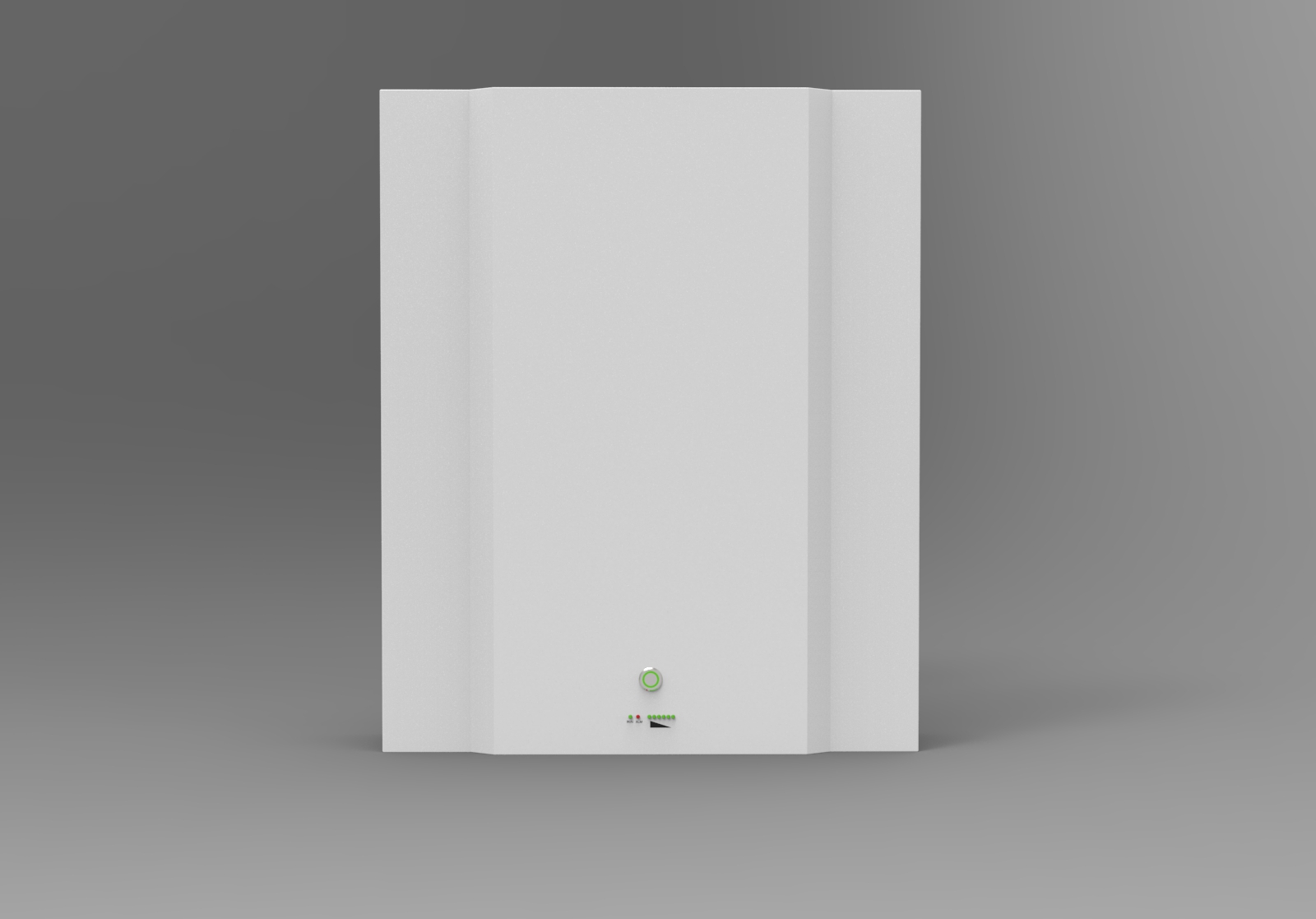Are you tired of constantly replacing your solar panel batteries? Do you want to learn how to maximize their lifespan and performance? Look no further than this article on mastering solar battery care.
In this guide, you will gain a comprehensive understanding of solar panel batteries, their lifespan, and how to identify signs of degradation. You will also learn essential battery maintenance and care techniques to ensure your batteries operate at their peak potential. By the end of this article, you will be equipped with the knowledge to choose the right solar battery for your needs and advanced techniques to further extend its lifespan. So, let's dive in and master solar battery care!
Key Takeaways:
- Proper maintenance and care is crucial for maximizing the lifespan and performance of solar panel batteries.
- - Different batteries may have specific maintenance requirements, so it's important to refer to the manufacturer's instructions for your particular model.
- - The depth of discharge (DOD) and temperature can impact the lifespan of solar batteries, and it's recommended to keep the DOD at or below 50% and manage the temperature within a range of 20 to 30 degrees Celsius.
- - Regular monitoring of battery health and performance through battery analyzers and load tests is essential for assessing battery health and identifying signs of degradation or wear.
Introduction
Welcome to our guide on mastering solar battery care! In this introduction, we'll go over some basic tips and tricks to help you maximize the lifespan and performance of your solar battery. Taking care of your lithium solar battery is important because it ensures that your system runs smoothly and efficiently. By following some simple maintenance routines, you can potentially extend the lifespan of your solar battery and save money in the long run.
Solar battery care involves a range of activities that are necessary to keep your battery in good condition. One of the primary reasons why solar panels need batteries is to store the energy generated during the day for use at night or during cloudy weather. This means that the battery is a crucial part of your solar system, and you need to take good care of it to ensure that it performs optimally. A well-maintained solar battery can last for many years, providing you with a reliable source of energy.
The lifespan of your solar system battery depends on several factors, including the quality of the battery, the frequency of use, and the maintenance routine you follow. In general, solar system batteries can last anywhere from 5 to 15 years. However, with proper care and maintenance, you can potentially extend the lifespan of your battery by several years. By investing a little time and effort into solar battery care, you can ensure that your solar system runs efficiently and provides you with reliable energy for years to come.

Understanding Solar Panel Batteries
You may be wondering why solar panels need batteries. The answer is simple: solar panels generate electricity only when the sun is shining, which means you need a way to store that energy so you can use it when the sun goes down or when it's cloudy. Utilizing solar panel batteries has numerous benefits, including reducing your reliance on the grid, providing backup power during outages, and helping to lower your energy bills.
Why Do Solar Panels Need Batteries?
Imagine powering your home with solar energy, but without the use of batteries, you wouldn't be able to store the energy for later use when the sun isn't shining. This is why solar panels need batteries. Solar panels generate electricity from the sun's energy, but this electricity is not constant and can vary depending on the weather. To ensure that you have a constant supply of electricity, you need to store the excess energy generated by the solar panels in batteries.
However, it's important to note that solar panel batteries require proper care and maintenance to maximize their lifespan and performance. This is where solar battery care comes in. By taking care of your solar batteries, you can ensure that they last longer and perform at their best. But how often do solar panel batteries need to be replaced? To give you an idea, here's a table that shows the typical lifespan of different types of solar batteries:
| Battery Type | Lifespan |
| Lead Acid | 3-5 years |
| Lithium Ion | 5-15 years |
| Nickel-Cadmium | 10-15 years |
| Flow Batteries | 20-25 years |
As you can see, the lifespan of solar batteries can vary greatly depending on the type of battery. By understanding the lifespan of your solar battery, you can plan ahead and ensure that you are prepared for when it needs to be replaced. By taking care of your solar batteries and understanding their lifespan, you can maximize their performance and ensure that you have a steady supply of electricity for your home.
Benefits of Utilizing Solar Panel Batteries
Utilizing solar panel batteries can provide an uninterrupted power supply during power outages and reduce reliance on traditional energy sources. But the benefits do not stop there. Here are three more advantages of using solar panel batteries:
1. Cost savings: By storing excess solar energy in lithium batteries, you can reduce your reliance on the grid and save on electricity bills. This is especially useful for those living in areas with high electricity rates.
2. Environmental friendliness: Solar panel batteries help reduce carbon emissions by promoting the use of renewable energy. By using solar energy, you are contributing to a cleaner and healthier planet.
3. Increased energy independence: Solar panel batteries provide an opportunity for individuals and communities to be more self-reliant when it comes to energy. You can generate your own power and control your energy usage, without being at the mercy of utility companies.
Overall, utilizing solar panel batteries is a smart choice for those looking to save money, reduce their environmental footprint, and increase their energy independence.

Understanding Solar System Battery Lifespan
You might be wondering how long your solar system batteries will last. Typically, solar system batteries have a lifespan of 5 to 15 years, depending on the type of battery and how well you maintain it. However, there are several factors that can affect the lifespan of your solar battery, such as temperature, depth of discharge, and frequency of use.
Typical Lifespan of Solar System Batteries
If you want to ensure that your solar system batteries last as long as possible, it's important to understand their typical lifespan. Knowing how long your batteries can last will help you plan for replacements and avoid unexpected expenses. Here are a few things to keep in mind about the typical lifespan of solar system batteries:
- The lifespan of a solar system battery can range from 5 to 15 years, depending on the type of battery and how well it's maintained.
- Lead-acid batteries are the most common type used in solar systems, and their lifespan is typically around 5 to 7 years.
- Lithium-ion batteries, on the other hand, can last up to 15 years and require less maintenance than lead-acid batteries. However, they are also more expensive upfront.
By understanding the typical lifespan of solar system batteries, you can make informed decisions about which type of battery to use and how often to replace them. It's important to keep in mind that proper maintenance and care can also extend the lifespan of your batteries beyond their typical range.
Factors Affecting Solar Battery Lifespan
To ensure your solar system batteries last, as long as possible, it's important to consider the factors that can impact their longevity. One of the main factors that affect the lifespan of solar batteries is the depth of discharge (DOD). This refers to the percentage of the battery's total capacity that is used before recharging. Generally, the more deeply a battery is discharged, the shorter its lifespan will be. It's recommended to keep the DOD at or below 50% to prolong the battery's lifespan.
Another factor that can impact the lifespan of solar batteries is the temperature at which they are stored and used. High temperatures can cause the battery to degrade faster, while low temperatures can reduce the battery's capacity. It's important to keep the batteries within a temperature range that is suitable for their chemistry. Additionally, the frequency of charging and discharging cycles can also affect the battery's lifespan. Overcharging or undercharging the battery can cause damage and reduce its overall lifespan. By taking these factors into consideration and ensuring proper care, you can maximize the lifespan and performance of your solar system batteries.

Signs and Indicators of Battery Degradation
If you want to make sure your solar battery lasts as long as possible, you need to know the signs of degradation. These may include reduced performance, shorter battery life, and a decrease in overall capacity. To keep track of your battery's health, it's important to monitor its performance regularly and be aware of any changes in its behavior.
Common Signs of Solar Battery Degradation
You may notice that your solar battery isn't performing as well as it used to, which is a common sign of degradation - just like how a car's engine starts to wear down over time and doesn't run as smoothly. There are several indicators that your solar battery may be experiencing degradation, such as reduced charging capacity, shorter lifespan, and a decrease in overall efficiency. These signs can make it difficult to rely on your solar battery for consistent power, especially during times of high energy consumption or inclement weather.
To help you identify the common signs of solar battery degradation, refer to the table below. This table outlines the top five signs that your solar battery may be experiencing degradation, along with their corresponding causes and potential solutions. By understanding these signs and taking proactive steps to address them, you can help maximize the lifespan and performance of your solar battery, ensuring that you have reliable access to clean energy for years to come.
| Sign of Battery Degradation | Cause | Potential Solution |
| Reduced charging capacity | Overuse or high temperatures | Reduce energy consumption or install a cooling system |
| Shorter lifespan | Exposure to extreme temperatures or overuse | Replace the battery or implement proper maintenance |
| Decreased efficiency | Age or improper usage | Upgrade to a higher efficiency battery or optimize usage habits |
| Increased self-discharge rate | Overuse or age | Implement proper maintenance or replace the battery |
| Swelling or leaking | Overcharging or overheating | Replace the battery immediately and safely dispose of the old battery |
| Failure to hold a charge | Old age or overuse | Consider replacing the battery or implementing better charging habits |
Monitoring Battery Health and Performance
Monitoring the health and performance of your solar battery is crucial for ensuring that it continues to provide reliable and sustainable energy, allowing you to feel confident in your investment and its impact on the environment. Here are some ways to effectively monitor your battery's health and performance:
- Regularly check the battery's voltage and charge levels using a multimeter or monitoring software.
- Keep track of the battery's temperature, as excessive heat can significantly reduce the battery's lifespan.
- Monitor the battery's discharge rate and capacity, as this can indicate whether the battery is operating at peak efficiency or if there are any issues that need to be addressed.
By regularly monitoring your solar battery's health and performance, you can identify any potential issues early on and take corrective action before they become more serious problems. This can help to extend the lifespan of your battery and ensure that you continue to get the most out of your investment in renewable energy.
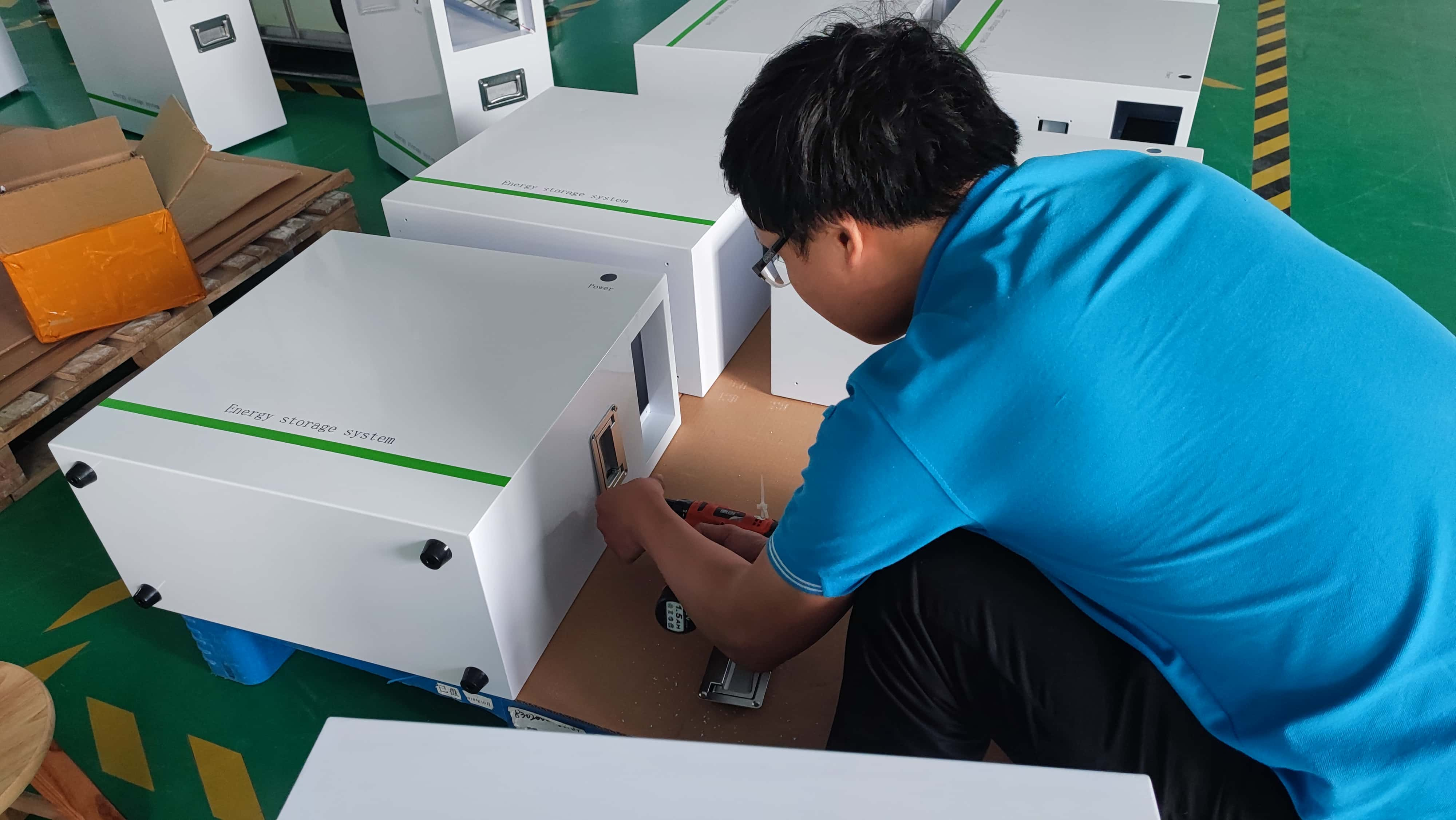
Maximizing Solar Battery Lifespan
If you want to maximize the lifespan of your solar batteries, there are several key points to keep in mind. First, proper maintenance is essential for extending battery life, so be sure to follow recommended care and cleaning procedures. Additionally, managing temperature is crucial for enhancing battery lifespan, so consider installing temperature control systems or choosing battery models with built-in temperature regulation features. Finally, optimizing charging cycles can help prolong battery life, so be sure to follow recommended charging protocols and avoid overcharging or undercharging your batteries.
Maintenance Tips for Extending Battery Lifespan
By properly maintaining your solar battery, it's possible to extend its lifespan and keep it performing at its best. Here are three maintenance tips that can help you achieve this:
1. Regularly check the water level of your battery and add distilled water if needed. Keeping the water level between the maximum and minimum markings on the battery's casing is important for its performance and lifespan.
2. Clean the battery terminals and connectors every few months to remove dirt and corrosion. This can improve the efficiency of the battery and prevent damage to other components in your solar system.
3. Avoid overcharging or undercharging your battery by monitoring its voltage regularly. A battery that is overcharged or undercharged can lead to reduced performance and a shorter lifespan. Using a charge controller can help prevent this from happening.
By following these maintenance tips, you can ensure that your solar battery lasts longer and performs better. Keep in mind that different batteries may have specific maintenance requirements, so it's important to refer to the manufacturer's instructions for your particular model.
Managing Temperature for Enhanced Battery Lifespan
Proper management of temperature is crucial for ensuring that your solar battery lasts as long as possible. High temperatures can cause damage to the battery cells and accelerate the aging process, while low temperatures can reduce the battery's capacity and performance. Therefore, you should aim to keep your solar battery within a temperature range of 20 to 30 degrees Celsius.
To manage the temperature of your solar battery, you can install it in a shaded area or use a battery enclosure that provides insulation and ventilation. You should also avoid exposing the battery to direct sunlight, which can cause it to overheat. In addition, you can use a temperature sensor to monitor the temperature of the battery and take action if it exceeds the safe range. By managing the temperature of your solar battery, you can enhance its lifespan and performance and maximize your investment in solar energy.
Optimizing Charging Cycles for Prolonged Battery Life
Now that you know how temperature affects your solar battery, it's time to discuss another important factor that can prolong its lifespan: optimizing charging cycles. This means charging your battery in a way that maximizes its performance and minimizes wear and tear, ultimately extending its lifespan.
To optimize your charging cycles, it's important to understand the two main types of charging: bulk charging and float charging. Bulk charging is when you charge your battery at a high rate until it reaches its maximum capacity, while float charging maintains the battery's state of charge without overcharging it. By balancing these two types of charging, you can maximize your battery's lifespan and performance. To help you understand this concept better, here's a table outlining the differences between bulk charging and float charging:
| Bulk Charging | Float Charging | |
| Speed | Fast | Slow |
| Capacity | Maximum | Maintains |
| Risk of Overcharging | High | Low |
| Recommended Use | Initial charging, when battery is low | Maintaining battery at full capacity |
By understanding the differences between bulk and float charging, you can optimize your charging cycles to ensure your solar battery lasts as long as possible. Remember to also consider temperature management and other best practices to maximize your battery's lifespan and performance.

Solar Battery Maintenance and Care
To ensure optimal performance and longevity of your solar battery, there are a few essential practices you should follow. Regular inspection and cleaning are crucial to keeping your battery in top shape. Charge control techniques can also help prolong the lifespan of your solar battery. By incorporating these practices into your maintenance routine, you can maximize the performance and lifespan of your solar battery.
Essential Practices for Solar Battery Maintenance
One of the most important aspects of solar battery care is understanding the essential practices for maintenance, but have you ever wondered what those practices entail? Here are some of the most important things you need to do to ensure that your solar battery lasts as long as possible:
| Essential Practice | Description |
| Regular Inspection | Check your battery's terminals, cables, and housing for signs of damage, corrosion, or loose connections. |
| Proper Ventilation | Your battery needs to be in a well-ventilated area to prevent overheating and reduce the risk of explosion. |
| Charge Control | Make sure that your battery is not overcharged or undercharged, as this can lead to a shorter lifespan. |
| Cleanliness | Keep your battery clean and free from dirt and debris to prevent damage and corrosion. |
| Water Level Check | If your battery requires water, be sure to check and refill it regularly to prevent damage and ensure optimal performance. |
By following these essential practices, you can ensure that your solar battery is well-maintained and operating at its best. Remember to always refer to your manufacturer's instructions for specific care and maintenance recommendations.
Regular Inspection and Cleaning for Optimal Performance
Make sure you regularly inspect and clean your solar battery to keep it in top condition, ensuring that you never have to worry about unexpected malfunctions or costly repairs down the line. Here are three reasons why this is essential:
1. Dirt and debris can accumulate on the solar panels, reducing their ability to absorb sunlight and convert it into energy. That means your battery won't be charged as efficiently, and you may experience a decrease in performance over time. Regular cleaning will help prevent this from happening.
2. Inspections can reveal any signs of damage or wear and tear on the battery, allowing you to address issues before they become major problems. This can save you money in the long run by avoiding the need for costly repairs or replacements.
3. By taking good care of your solar battery, you can extend its lifespan and ensure that it continues to provide reliable, efficient power for years to come. This not only benefits you financially but also helps reduce your carbon footprint and contribute to a more sustainable future. So make sure you incorporate regular inspections and cleaning into your maintenance routine.
Charge Control Techniques to Prolong Battery Lifespan
You'll want to pay close attention to how you manage your solar battery's charging process if you're looking to get the most out of it over a long period of time. Charge control techniques are crucial to prolonging your battery's lifespan and maximizing its performance.
One technique is to avoid overcharging your battery. This can be done by using a charge controller that regulates the amount of current going into the battery. Overcharging can cause irreversible damage to the battery, shortening its lifespan. Another technique is to avoid deep discharging the battery. This means not letting the battery's charge drop below a certain percentage, usually around 50%. Deep discharging can also shorten the battery's lifespan. By implementing these charge control techniques, you can ensure your solar battery lasts as long as possible and performs at its best.
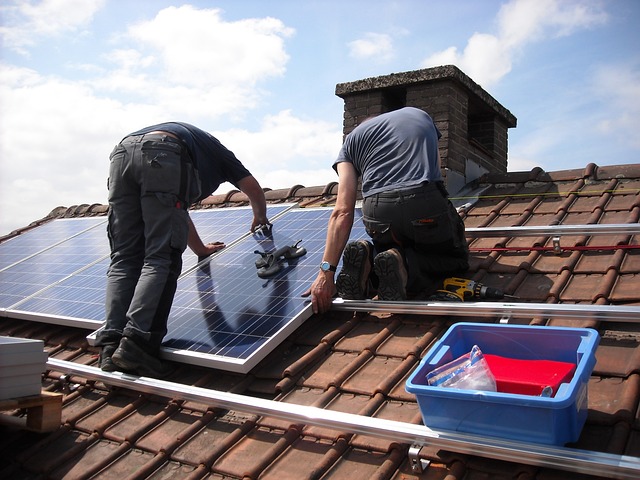
Choosing the Right Solar Battery
When choosing the right solar battery, it's important to consider the available types on the market. There are various options to choose from, including lead-acid, lithium-ion, and flow batteries, each with its own benefits and drawbacks. You should also take into account factors such as energy storage capacity, durability, and cost when selecting the best solar battery for your needs.
Types of Solar Batteries Available
You might be curious about the various types of solar batteries available - did you know there are several options to choose from? Here's a rundown of the most common types of solar batteries:
- Lead-acid batteries: These are the most common type of solar battery and are relatively inexpensive. They can be further divided into two categories: flooded and sealed. Flooded lead-acid batteries require regular maintenance, including adding distilled water to the cells, while sealed lead-acid batteries are maintenance-free.
- Lithium-ion batteries: These are a newer and more expensive type of solar battery, but they offer several advantages over lead-acid batteries. Lithium-ion batteries are lighter, have a longer lifespan, and require less maintenance.
- Nickel-cadmium batteries: These are an older type of solar battery that's becoming less common due to environmental concerns over the toxic cadmium used in them. However, they still have some advantages, including their ability to operate in extreme temperatures and their long lifespan.
- Flow batteries: These are a newer and more expensive type of solar battery that uses a liquid electrolyte that's stored in external tanks. They offer several advantages, including the ability to store a large amount of energy and the ability to discharge and recharge simultaneously.
Explore the range of options available at HARVEYPOW and make an informed decision today.
Now that you know a bit more about the types of solar batteries available, you can make an informed decision about which one is right for you and your solar power system. Keep in mind that the right choice will depend on factors such as your budget, energy needs, and how much maintenance you're willing to do.
Considerations for Selecting the Right Battery
Choosing the ideal solar battery can be challenging, but with a few key considerations, you can simplify the decision-making process. Start by assessing your energy requirements, budget, and maintenance preferences. Determine the power output of your solar panels to gauge the appropriate battery size and capacity for efficient energy storage.
Budget plays a crucial role, so align your choice with the price range that suits your financial plan while still meeting your energy demands. Equally important is evaluating the maintenance needs of various batteries. Some may require regular upkeep, while others are maintenance-free. Selecting a battery that aligns with your maintenance capabilities ensures longevity and optimal performance.
Take these factors into account when selecting a solar battery to maximize its lifespan, performance, and suitability for your energy needs. Explore the range of options available at HARVEYPOW and make an informed decision today.
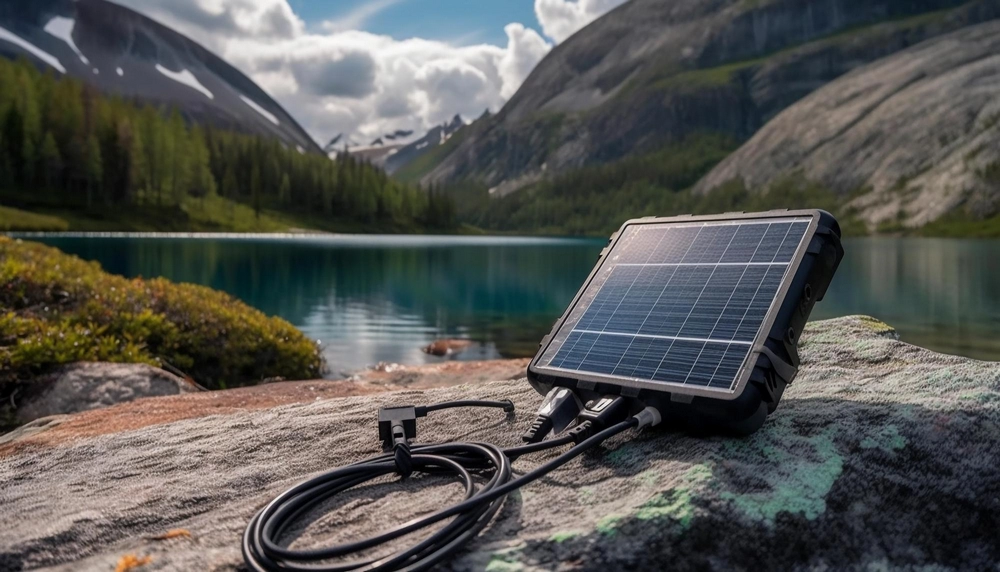
Battery Replacement Considerations
When it comes to your solar panel system, it's important to know when you may need to replace your batteries. The lifespan of your batteries will depend on a few factors, such as usage and maintenance, but generally, they can last anywhere from 5 to 15 years. Signs that indicate the need for battery replacement include a decrease in performance, frequent system failures, and visible damage or corrosion. To determine whether it's time to replace your batteries, you'll need to assess their health and consider factors like their age and overall condition.
How Often Do Solar Panel Batteries Need To Be Replaced?
So, how often do solar panel batteries actually need to be replaced? Well, it depends on several factors. The lifespan of a solar panel battery varies depending on its type, usage, and maintenance. Generally, lead-acid batteries last between 3-5 years, while lithium-ion batteries can last up to 15 years. However, this is just an estimate and the actual lifespan of a battery can be affected by different factors such as temperature, depth of discharge, and the number of charge and discharge cycles it undergoes.
To ensure that your solar batteries last longer, it's essential to follow proper maintenance procedures. This includes regularly checking the battery's charge level, cleaning its terminals, and monitoring its temperature. It's also important to avoid overcharging or undercharging the battery and to store it in a cool, dry place. By taking good care of your solar batteries, you can maximize their lifespan and reduce the need for replacements.
Signs Indicating the Need for Battery Replacement
If you've noticed a decrease in your solar panel system's efficiency or a shorter battery life, it may be a sign that a replacement is necessary. Ignoring these signs can lead to further damage and decreased performance, ultimately costing you more money in the long run. It's important to keep an eye out for these signs so that you can replace your battery before it completely fails.
Here are some signs that indicate the need for battery replacement:
- The battery is not holding a charge as long as it used to
- The battery is taking longer to charge
- The battery is swollen or leaking
If you notice any of these signs, it's essential to take action and replace your battery as soon as possible. Doing so will not only improve your system's efficiency and performance, but it will also save you money in the long run. Remember to regularly check your battery's performance and take action if you notice any issues.
Assessing Battery Health and Determining Replacement Needs
Assessing the health of your solar panel system's battery is crucial to ensuring its longevity and avoiding costly replacements, which can be done by regularly monitoring its charge capacity and detecting any signs of damage or wear. One way to do this is by using a battery analyzer, which measures the voltage and current of the battery to determine its state of charge and overall health. Another method is to perform a load test, which involves discharging the battery to a specified level and then measuring its voltage recovery time to determine its capacity.
It's important to note that batteries typically have a lifespan of 5-10 years, depending on usage and maintenance. As your battery nears the end of its life, you may notice a decrease in its performance or capacity. If you're uncertain about the health of your battery, it's best to consult with a professional or contact the manufacturer for guidance. By regularly assessing the health of your solar panel system's battery, you can ensure that it performs optimally and lasts for its full lifespan.
| Test | Description |
| Battery Analyzer | Measures voltage and current to determine the state of charge and overall health of the battery |
| Load Test | Discharges battery to a specified level and measures voltage recovery time to determine the capacity |
| Voltage Test | Measures voltage of the battery to determine if it's fully charged or needs charging |
| Visual Inspection | Inspects the battery for signs of damage or wear, such as bulging, leaking, or corroded terminals |
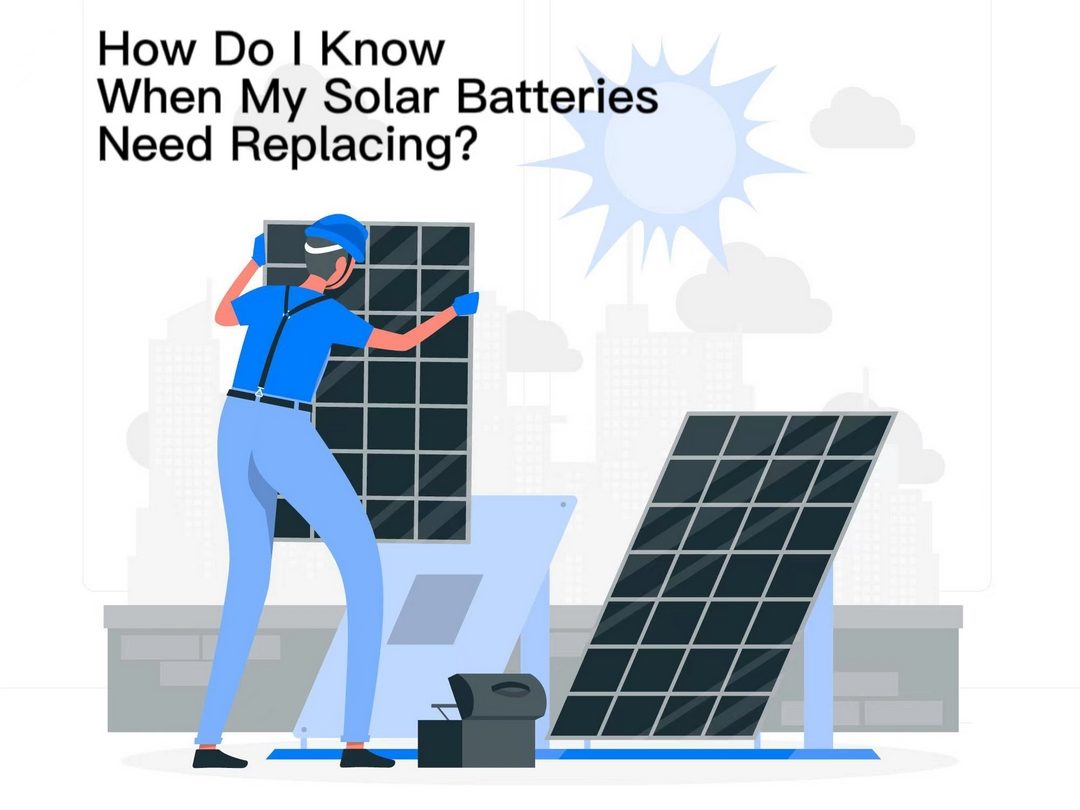
Advanced Techniques for Solar Battery Care
You may be interested in learning about the latest innovations in solar battery technology, as well as emerging trends in solar battery maintenance. Additionally, exploring future developments to improve battery lifespan can help you stay ahead of the curve and maximize the performance of your solar energy system. By staying informed about advancements in solar battery care, you can ensure that your system operates at peak efficiency and has a long lifespan.
Innovations in Solar Battery Technology
With advancements in solar battery technology, we are seeing more efficient and longer-lasting batteries that are revolutionizing the way we store and use renewable energy. One such innovation is the lithium-ion battery, which offers a higher energy density and longer lifespan than traditional lead-acid batteries. These batteries are also lighter and more compact, making them easier to install and transport.
Another exciting development is the flow battery, which uses liquid electrolytes to store energy. These batteries have a longer lifespan than lithium-ion batteries and can be charged and discharged without losing capacity. Additionally, flow batteries can be easily scaled up or down depending on energy needs, making them ideal for both residential and commercial use. With these advancements, the future of solar battery technology looks bright, paving the way for a more sustainable and renewable energy future.
Emerging Trends in Solar Battery Maintenance
Now that you are familiar with the latest innovations in solar battery technology, it's time to focus on how to maintain these cutting-edge batteries for maximum efficiency and lifespan. In today's world, solar battery maintenance is becoming increasingly important as more and more households and businesses rely on solar energy to power their daily activities. Fortunately, emerging trends in solar battery maintenance are making it easier than ever to keep your batteries in top condition.
One trend that's gaining popularity is the use of smart battery management systems. These systems use advanced algorithms to monitor battery performance and adjust charging and discharging cycles to optimize efficiency and prolong lithium battery life. Additionally, some systems can even predict battery failures and alert users before they occur, allowing for proactive maintenance. Another emerging trend is the use of remote monitoring and maintenance services. With these services, experts can remotely monitor and diagnose battery issues, reducing the need for on-site maintenance and saving time and money. By staying up-to-date with these emerging trends and utilizing the latest maintenance technologies, you can ensure that your solar batteries are performing at their best for years to come.
Future Developments to Improve Battery Lifespan
Get ready for longer-lasting batteries! Future developments are set to revolutionize the lifespan of batteries. With advancements in technology, The top lithium battery manufacturers are constantly researching and developing new ways to improve the longevity of batteries. Here are three exciting developments to look out for:
- Solid-state batteries: Unlike traditional lithium-ion batteries, solid-state batteries use a solid electrolyte instead of a liquid one. This makes them safer, more efficient, and longer-lasting. They also have the potential to store more energy, which means they can power devices for longer periods of time.
- Battery management systems: These systems use software to monitor and optimize the performance of batteries. They can detect and prevent issues like overcharging, overheating, and over-discharging, which can all contribute to battery degradation. By keeping batteries in optimal condition, battery management systems can significantly extend their lifespan.
- Self-healing batteries: Imagine a battery that can repair itself when damaged. That's the idea behind self-healing batteries, which use materials that can regenerate and repair themselves when exposed to certain conditions. This could make batteries more resilient and longer-lasting, as they would be able to recover from damage that would otherwise render them unusable.
These developments are just a glimpse of what's to come in the world of battery technology. As we continue to rely more on battery-powered devices, it's exciting to see how batteries will evolve to meet our needs.

Environmental Impact and Sustainability
In the realm of solar energy, maximizing solar battery lifespan goes beyond personal gains—it's a crucial step towards environmental sustainability and reducing electronic waste. By extending the life of your solar batteries, you're actively contributing to a greener future.
- Reducing Electronic Waste: Every battery that prematurely reaches the end of its lifespan adds to the growing electronic waste problem. Longer-lasting solar batteries mean fewer replacements and fewer discarded electronic components, thus curbing the strain on our planet's resources.
- Conserving Resources: When batteries last longer, the demand for new batteries diminishes. This translates to a reduced need for the raw materials required in battery production, which, in turn, conserves valuable resources and lowers the ecological footprint associated with manufacturing.
- Embracing Responsible Energy Consumption: Taking care of your solar batteries aligns perfectly with responsible energy consumption practices. By ensuring that your existing batteries remain efficient and functional, you're making the most of the energy stored within them and reducing the need for excess energy production.
- Minimizing Carbon Footprint: A longer solar battery lifespan helps you harness the full potential of your solar energy system. This not only minimizes your reliance on non-renewable energy sources but also lowers your carbon footprint by reducing the overall energy consumption from conventional grids.
- Promoting a Sustainable Future: When you extend the lifespan of your solar batteries, you're actively participating in a more sustainable energy ecosystem. Your actions echo the core principles of responsible energy use and environmental consciousness, paving the way for a cleaner and healthier planet.
As you embark on your solar battery care journey, remember that each step you take towards extending their lifespan is a step towards a brighter, more sustainable future for all. By embracing the eco-friendly benefits of responsible energy consumption, you're not only optimizing your own energy use but also playing a pivotal role in safeguarding the environment for generations to come.
Comparing Solar Battery Lifespan with Traditional Energy Sources
As you delve into the realm of solar battery care, it's essential to contextualize the significance of battery lifespan within the broader landscape of energy solutions. Let's take a moment to compare the expected lifespan of solar batteries with that of traditional backup power sources, such as generators or lead-acid batteries.
Solar Battery Lifespan
Solar batteries, intricately designed to complement renewable energy systems, exhibit a notable advantage in terms of longevity. Depending on the battery type and quality, solar batteries can offer a lifespan that extends beyond a decade. This extended duration ensures a consistent and reliable energy reservoir, vital for bridging power gaps during extended outages or periods of limited sunlight.
Traditional Backup Power Solutions
Conversely, traditional backup power alternatives like generators and lead-acid batteries often present shorter lifespans. Generators, while swift in providing immediate power, come with the requirement for ongoing maintenance and a continuous supply of fuel. Lead-acid batteries, commonly used in backup systems, tend to degrade over time, necessitating more frequent replacements.
Long-Term Financial and Environmental Advantages
Opting for solar battery systems holds long-term benefits, both financially and environmentally. The extended lifespan of solar batteries translates to fewer replacement cycles and reduced associated costs. This leads to diminished maintenance expenditures and a more stable financial outlook over the system's lifecycle.
From an environmental perspective, the advantages of solar batteries are even more pronounced. Their extended lifespan contributes to a decreased demand for new battery production, thereby minimizing the environmental footprint tied to manufacturing and disposing of batteries. This aligns seamlessly with the broader objective of curbing electronic waste and promoting sustainable energy practices.
Considering backup power solutions is a multi-faceted decision, and battery lifespan is a crucial factor. As you engage in solar battery care practices to prolong their lifespan, remember that solar batteries offer not only reliable energy storage but also a pathway toward long-term financial savings and environmental responsibility. By choosing to invest in solar battery systems, you're not just securing your power needs; you're actively contributing to a cleaner, more sustainable energy landscape for generations to come.

Conclusion
Congratulations on mastering the art of solar battery care and maximizing the lifespan and performance of your solar system. By implementing maintenance tips and understanding the significance of proper battery care, you are well-equipped to save both money and energy in the long run.
As the saying goes, "An ounce of prevention is worth a pound of cure." This adage holds true for your solar battery. By dedicating time and effort to caring for your battery and proactively identifying any signs of degradation, you can avoid costly replacements and ensure the seamless operation of your solar system.
Now, armed with the knowledge and practices outlined in this guide, it's time to take action. Reach out to the experts at HARVEYPOW for personalized solar battery solutions and guidance. Our experienced team will provide you with the support and expertise you need to make informed decisions and optimize the performance of your solar system.
Don't wait any longer. Take control of your solar battery's longevity and enjoy the multitude of benefits that come with a reliable and efficient energy solution.
Contact HARVEYPOW for Expert Solar Battery Solutions and Guidance Today!
